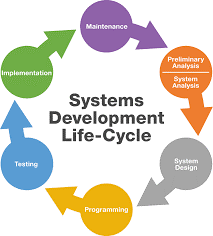- October 14, 2022
- Posted by: Andrej Stojanovski
- Category: IGA News

SDLC-System Development Life Cycle
SDLC stands for System Development Life Cycle is the process of determining how an information system (IS) can support business needs, designing the system, building it, and delivering it to users.
If you have taken a programming class or have programmed on your own, this could probably sound pretty much simple. In the real world, however, it is not simple.
In 2010, an estimated $ =2.4 trillion$= was spent by organizations and governments on IT hardware, software, and services worldwide. This spending level was projected to increase by 3.5% in 2011.
A 2009 study attempting to quantify the costs of this failure rate estimated a toll on the global economy of $6.2 trillion.
Today both businesses and governments experience embarrassing and costly errors, in their information system.
The key Peron in the SDLC is the system analyst, who analyzes the business situation, identifies opportunities for improvements, and designs an information system to implement the improvements.
Many system analysts view their profession as one of the most interesting, exciting, and challenging jobs around. As a system analyst, you would work as a team with a variety of people, including business and technical experts.
It is important to remember that the primary objective of the systems analyst is not to create a wonderful system. The primary goal is to create value for the organization, which for most companies means increasing the profit Many failed systems were abandoned because the analyst tries to build a wonderful system without clearly understanding how the system would support the organization’s goals, improve business process, and integrate with other information systems to provide value.
WHAT SKILLS SHOULD
THE BUSINESS ANALYSTS HAVE?
Well if you want to be an Analyst, you need to possess a few ( not so hard 😛 ) skills.
As we said, system analysts play a key role in information system development projects. The system analysts always work closely with all project team members so that the team develops the right system in an effective way.
System Analyst Skills
Analysts must have the technical skills to understand the organization’s existing technical environment, the new system’s technology foundation, and the way in which both can be fit into an integrated technical solution. Business skills are required to understand how IT can be applied ti business situations and to ensure that the IT delivers real business value.
Interpersonal skills are needed so the analysts can communicate effectively, one-on-one with users and business managers (who often have little experience with technology) and with programmers (who often have more technical expertise than the analyst does).
Managerial skills are the skills that they must have, so they would be able to give presentations to large and small groups and to write reports. Not only do they need to have strong interpersonal abilities, but they also need to manage people with whom they work, and they must manage the pressure and risks associated with unclear situations.
Aaaand finally, analysts must deal fairly,honestly, and ethically with other project team member, managers, and system users. Analysts often deal with confidental information or information that, if shared with others, could cause harm. Which make them have the Ethical Skills.
Stay with us for more interesting content
Keep in touch 🙂
